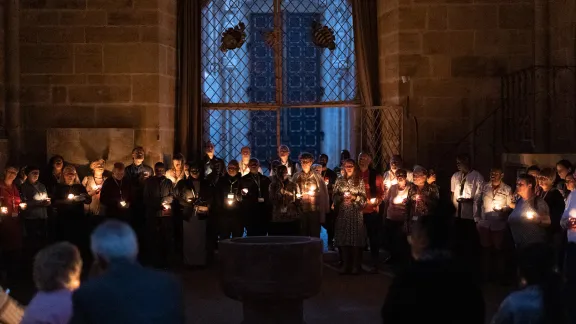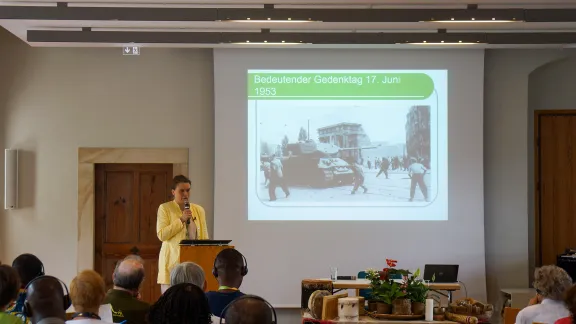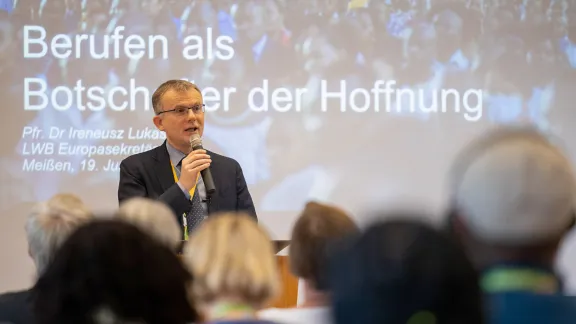A recent partnership conference held in Germany brought together Lutherans from across the LWF communion, strengthening their witness for hope and peace in their churches and societies.

Participants of the partnership conference of the Evangelical Lutheran Church of Saxony (EVLKS) during a church service. The conference had the theme “... to give you a future and a hope” (Jer 29:11). Photo: EVLKS
Partnership conference strengthens international and ecumenical relations
About 100 participants of different generations from 16 countries participated in the partnership conference of the Evangelical Lutheran Church of Saxony (EVLKS) held in Meißen from 15 to 21 June under the theme “... to give you a future and a hope” (Jer 29:11).
“Our idea is to have such a partnership meeting in the year of the Assembly of the Lutheran World Federation (LWF) to offer an experience of the connectedness across the LWF communion,” said Rev. Friedemann Oehme, secretary for ecumenical relations of the EVLKS. “At the first meeting of this kind in 2016, we could also participate in the Wittenberg Pilgrimage during the LWF Council meeting.”
Our idea is to have such a partnership meeting in the year of the LWF Assembly to offer an experience of the connectedness across the LWF communion.
– Rev. Friedemann Oehme, Secretary for Ecumenical Relations, Evangelical Lutheran Church of Saxony
“Our church, its regions and congregations, has partnership relations with 22 countries,” Oehme said. “For the 2023 partnership meeting, we invited people from the grassroots level – two international people for every participant from EVLKS.” Participants came from Papua New Guinea, India, Tanzania, South Africa, Argentina, Paraguay, Colombia, Cuba, the USA, Denmark, Sweden, Latvia, Russia, Poland, the Czech Republic, Romania and Germany.
For the participants, the diversity of the LWF communion became evident and encouraged all to continue and further develop the partnership work between their churches. The EVLKS department for ecumenical relations, the One World Office, and the Leipziger Missionswerk jointly hosted the event prepared by staff and volunteers.
Among the speakers at the meeting were LWF Council member Bettina Westfeld, who is also synod president of the EVLKS, and the LWF’s Regional Secretary for Europe, Rev. Dr. Ireneusz Lukas.

LWF Council member and EVLKS synod president Bettina Westfeld during her presentation. Photo: EVLKS
Justice, peace and the integrity of creation
Commemorating the East German Uprising on 17 June 1953, Westfeld recalled the “Uprising for Justice and Freedom” in the then German Democratic Republic (GDR). Soviet troops forcefully put it down, and it was not until the Peaceful Revolution of 1989 that the people of East Germany were to succeed in bringing about change without weapons.
Westfeld saw essential roots for the success of the 1989 revolution in notions promoted by the global ecumenical movement, but especially in the conciliar process of Christian churches on justice, peace and the integrity of creation, which began internationally in 1983 and also “unfolded great power in the GDR.”
“1983 was a time when the Eastern and Western blocs were facing each other armed to the teeth, with nuclear war a serious threat,” Westfeld said. “In addition, environmental degradation was becoming increasingly obvious. Also, we were not acting as in One World; we were talking about the First, Second and Third Worlds.”
Then, on 30 April 1989, the Ecumenical Assembly for Justice, Peace and the Integrity of Creation held in the GDR concluded in Dresden. Twelve texts were adopted there that “still set standards today,” Westfeld said. “Crucial is the insight: there can be no peace without justice and the integrity of creation.”
People involved in the Ecumenical Assembly were later involved in the Peaceful Revolution. “Churches were a space for conversation, a place where people exchanged ideas and reached out to each other.”
After 1989, the churches’ challenge was maintaining their joint commitment to justice, peace and the integrity of creation – despite all the social and structural changes in the country. “In a secularized society and a minority situation as we have here in Saxony, there is a danger that people will only revolve around themselves,” Westfeld warned. Still, she said, there have always been a few people engaged with these issues.
Since 2021, she said, there has been an initiative called “Ecumenical Roadmap for Justice, Peace and the Integrity of Creation.” It encourages “grassroots actors in our congregations to get involved in these issues,” Westfeld said. “They are sometimes very few, but they become the salt of the earth. We belong to one church, living together in one world, caring for our neighbor, and responsible for caring for creation.”

LWF Regional Secretary for Europe, Rev. Dr. Ireneusz Lukas, giving his presentation. Photo: EVLKS
Called to be ambassadors of hope
“For me, the story of the LWF is a story of hope. It is the story of many open and hopeful people who have not conformed to the world,” Ireneusz Lukas emphasized in his presentation on the theme “Future and Hope for our Partnerships and our Churches – Called to be Ambassadors of Hope.”
“Hope is a gift of the Holy Spirit that people cannot generate on their own,” Lukas said. “In the Christian faith tradition, hope is built solely on Jesus Christ himself, who promised redemption and liberation to all of God’s creation.”
He said that LWF member churches are witnesses to economic, political and social injustices. “People have been and continue to be excluded, marginalized and oppressed in many places because of the color of their skin, their gender, their social situation of their geographic location,” Lukas said. “Some have been trafficked, many have been killed in wars, and still others are victims of torture. The victims of unjust structures hope for the realization of God’s goodness, for the realization of justice and righteousness.”
For churches to be “credible witnesses of hope and to put it into action, it is necessary to analyze what is happening around us to identify the main contextual challenges,” Lukas said.
Given the multitude and magnitude of current challenges, it is crucial to recognize that “doubt and faith are like siblings” that “need each other,” Luke said. “They should correct each other. Faith, without doubt, can lead to fanaticism, but doubt that ignores its doubting can also lead to cynicism and bitterness.”
The most significant task for the LWF and its member churches, he said, is to be “messengers of hope and reconciliation” – within their own ranks and in society.
To do that, “it is important not to be instrumentalized by politics, but to stand up for human dignity and reconciliation,” Lukas said. “At the same time, we cannot speak of reconciliation as something in which the oppressed are simply called upon to reconcile with their oppressors without expecting repentance or healing of memories. Without justice, there can be no lasting peace.”
At the same time, Christians should remember “that it is God who brings about reconciliation, but we are participants in the process.”
“Peace, reconciliation and conflict resolution will be of great importance in the years to come,” Lukas said.


